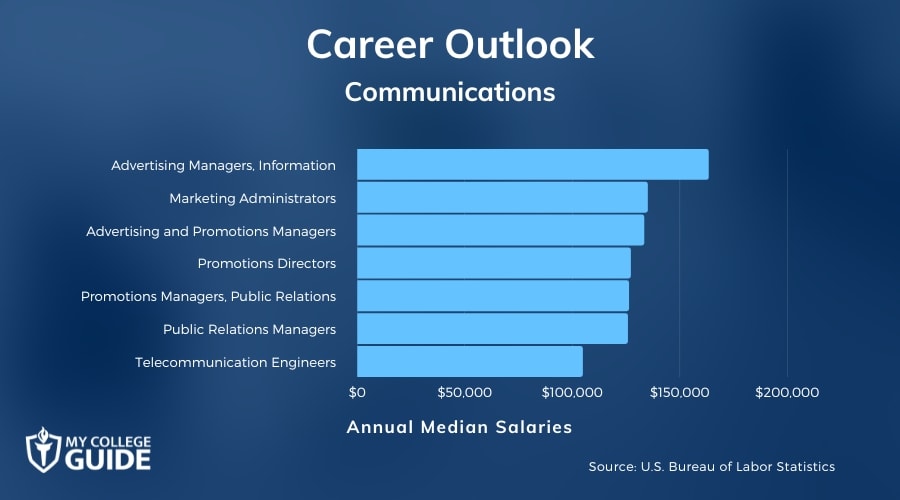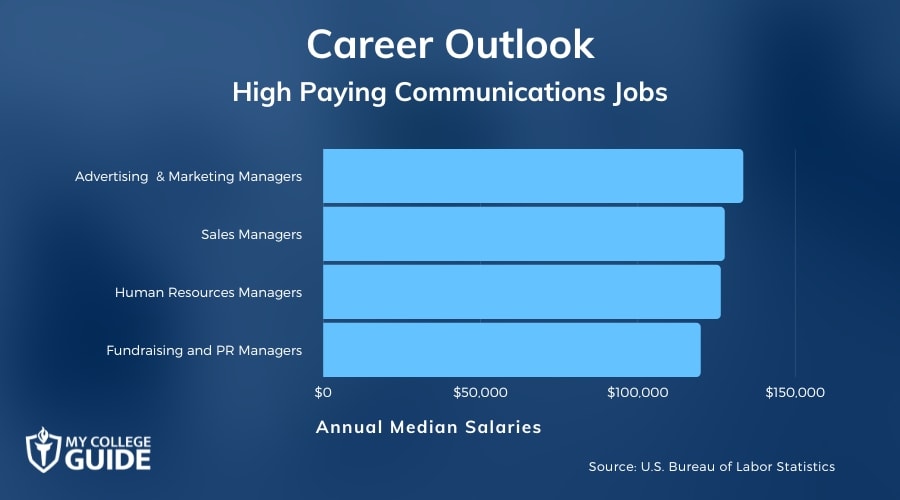A communications degree can catapult you into the world of communications careers, opening you up to various opportunities.

A communications degree has a lot to offer and is very versatile. You can choose to become a broadcaster, promotions manager, editor, or writer. Whatever your passion is, communications allows you to combine creativity with research.
Editorial Listing ShortCode:
Communication degree students focus on the media, technical communications, and advertising. Learn more about the degree path and if a communications career is right for you.
What Can You Do With a Communications Degree?

You can earn your degree in communications online at the associate’s, bachelor’s, and master’s degree levels. With the variety of career paths related to communication, the courses that you take will vary based on your area of interest. The career path you take after completing your communications degree depends on where your passion lies.
Perhaps you love using your creative skills to create marketing and promotional materials. With a communications degree, you can use your marketing skills to help brands communicate their messages. Perhaps you like being more on the front lines, and if so, you could become a TV reporter or news broadcaster.
Editorial Listing ShortCode:
If you are not too keen on being on camera, you can work behind the scenes as an editor or writer. If you have strong leadership and organizational skills, then you may want to focus on management concentrations. Do you have a knack for public speaking? If so, public relations may be an excellent choice for you. A communications degree offers a lot of variety when it comes to career choices.
10 Career Paths with a Degree in Communications
A communications degree can lead to a wide variety of careers, such as public relations, advertising and marketing, event planning, human resources, and fundraising management.
It can also be useful for careers in media such as broadcast and video technicians, editors, writers, and news analysts or journalists. Getting a degree in communications can offer you some flexibility in career ideas because its a versatile field that equips you with skills to work in virtually any industry.
1. Public Relations Specialist

According to the Bureau of Labor Statistics, public relations specialist is a common media and communications occupation. These professionals may work for the government, educational services, or organizations.
Public relations specialists perform a variety of tasks, ranging from writing press releases and communicating on a client’s behalf to evaluating various programs and public opinions. They can specialize in social media, sports, politics, or other industries.
2. Advertising, Promotions, and Marketing Managers

Advertising, promotions, and marketing managers work to promote brands, products, and services of businesses or companies. Most work for advertising, public relations, or similar services.
Responsibilities can vary depending on where these professionals work. They typically create advertising and promotions plans and campaigns, conduct market research, negotiate contracts, and develop pricing strategies.
3. Event Planner

Event planners are responsible for planning and coordinating the details of different types of events. Some may specialize in specific events, such as weddings and business or nonprofit events.
Daily tasks of an event planner can include meeting with clients to gather details about the event, coordinating the event, ensuring that venues and costs match client requests, and approving transactions.
4. Human Resources Specialist

Human resources specialists help with the recruitment, hiring, and training of businesses and organizations. They’re involved in interview processes, reviewing applications, and resolving employee conflicts.
Most human resources specialists work in an office setting for employment services, but they’re also employed by government entities and healthcare facilities. Some positions may involve travel for special events or meetings.
5. News Analysts, Reporters, and Journalists

Communications can be helpful for news analyst, reporter, and journalist positions because these professionals communicate information to the public. News anchors are a type of news analyst that informs the public on current events.
Journalists research and investigate a variety of topics and write articles for different media outlets. Reporters may work for news agencies, radio stations, or newspapers to report on current events.
6. Writers

Writers and authors create different types of content through various forms of media. Some may work in the digital media realm, while others work for periodicals. They conduct research and ensure that the information they’re providing is factual.
Editorial Listing ShortCode:
According to the Bureau of Labor Statistics, most writers are self-employed. Others are employed by professional, technical, information, or scientific services. They may also work in education or for organizations.
7. Fundraising Manager

The majority of fundraising managers work for grantmaking, professional, religious, or related organizations. They also work in educational services, social assistance, and hospitals.
Fundraising managers are responsible for creating fundraising strategies to help plan and organize fundraiser events. They contact potential donors and maintain contact with current donors. They also apply for grants, assign fundraising activities to other professionals, and help clients or employers reach fundraiser goals.
8. Broadcast, Sound, and Video Technicians

A degree in communications can be useful for broadcast, sound, and video technicians because they work with various equipment that individuals use to communicate with the public or specific audiences.
Responsibilities can vary depending on these roles. Broadcast technicians are responsible for setting up and operating equipment for radio or television broadcasts. Audio and video technicians handle audio and video equipment used for performances, events, or broadcasting.
9. Editor

Editors work in an office setting remotely or onsite as self-employed workers or for newspaper, book, or periodical publishers. They may also work for other professionals and information services.
Editors are responsible for reading content and checking it for spelling, punctuation, and grammatical errors. They work with other professionals, such as content strategists and writers. Editors may coordinate with employers to come up with content ideas to distribute to writers.
10. Market Research Analyst

Market research analysts keep track of market and sales trends to provide helpful information for marketing strategies. These professionals gather consumer data and create reports to give to clients or employers. They use various data collection methods, including conducting surveys and polls.
Market research analysts work in a variety of settings, including management and consulting services, finance and insurance, and wholesale trade. As you can see, there are a variety of careers for communication majors, allowing you to choose what best suits your needs and passion.
Online Communications Degrees

Communications is a degree that can be found at the undergraduate and graduate levels. The following are communications degrees that individuals might consider pursuing:
- Associate’s Degree in Communications: An associate’s degree is an undergraduate program that typically takes two years to complete. This degree may be good for students who want to explore communications as a career option.
- Bachelor’s Degree in Communications: A bachelor’s is an undergraduate degree that typically takes four years to complete. It can be an ideal degree for students interested in a communications career and possibly considering earning a higher degree later on.
- Master’s Degree in Communications: Topics are explored more in-depth and students typically narrow their focus to a particular field or industry to develop career-oriented skills and knowledge.
- Doctorate Degree in Communications: A doctorate in communications is more research-based and prepares students to be experts in communications as scholars.
The type of communications degree you may choose can depend on what your career goals are. Many communications jobs are available to professionals with an associate’s or bachelor’s degree.
Editorial Listing ShortCode:
Graduate-level degrees can be useful for individuals who wish to specialize in a specific communications career field. A doctorate in communications might be attractive to professionals who want to deepen their research and analytical skills or work in academia.
Communications Careers & Salaries

To help you get a clearer picture of what you could earn midway through a career in communications, we have put together a list of the top 40 communications careers & salaries according to data obtained from the U.S. Bureau of Labor Statistics.
| Careers | Annual Median Salaries |
| Advertising Managers, Information | $163,360 |
| Marketing Administrators | $135,030 |
| Advertising and Promotions Managers | $133,380 |
| Promotions Directors | $127,150 |
| Promotions Managers, Public Relations | $126,300 |
| Public Relations Managers | $125,780 |
| Telecommunication Engineers | $104,820 |
| Advertising Producers | $99,810 |
| Directors, Motion Picture and Video Industries | $98,680 |
| Writers, Informational | $80,560 |
| Producers | $79,000 |
| Editors, Professional and Scientific | $78,270 |
| Technical Writers | $78,060 |
| Professors of Communication and Writing | $77,560 |
| Writers and Authors | $69,510 |
| Public Relations Specialists, Advertising | $69,170 |
| Marketing Specialists | $63,920 |
| Editors | $63,350 |
| Video Editors, Motion Picture | $63,140 |
| Vice Presidents of Public Relations | $62,800 |
| Media and Communication Workers | $62,340 |
| Newspaper Editors | $61,060 |
| Broadcast Announcers, Television | $60,800 |
| Producers, Radio and Television Broadcasting | $60,550 |
| Sound Engineering Technicians | $60,500 |
| Motion Picture Broadcast Technicians | $60,490 |
| Sports Broadcasters | $59,760 |
| Broadcast Photographers | $50,130 |
| Stage Technicians | $49,900 |
| News Reporters, Radio and Television Broadcasting | $49,720 |
| Interpreters and Translators | $49,110 |
| Film Editors, Television Broadcasting | $49,100 |
| Film and Video Editors | $48,920 |
| Sound Technicians, Performing Arts, Spectator Sports, and Related Industries | $48,830 |
| Audio and Video Technicians | $48,820 |
| News Analysts | $48,370 |
| Photographers, Newspaper | $47,130 |
| Photographers | $38,960 |
| Journalists, Newspaper | $38,210 |
| Broadcast Technicians, Radio and Television | $37,640 |
When deciding on a career path, it is always a good idea to consider the projected growth of your chosen field. Luckily, as with business careers and computer science careers, the communications career outlook seems to have a strong future as the needs of the business world continue to evolve and expand.
The Bureau of Labor Statistics projects that media and communication occupations will grow 6% over the next 10 years, resulting in over 68,600 new jobs. This growth is largely due to the increasing demand for businesses to develop a strong online and public presence in order to make their brand messaging relatable to a new generation of information-hungry consumers.
Editorial Listing ShortCode:
The diversity within the communications field is a huge draw for students looking to capitalize on their passion for the written and spoken word, and you can easily customize your degree program to a number of different career options. Whether you attend a traditional or online college, the sky is the limit for the potential you have when considering a career in communications.
How to Know if a Career in Communications is Right for Me

Careers in communications can be very flexible because skills acquired throughout the degree program can be applicable to several industries.
Individuals who have good written and verbal communication skills and succeed at presenting information in an engaging way might enjoy a career in communications. You may get the opportunity to have some creative freedom with various communications jobs.
A number of advantages can come with working in communications, such as:
- Developing strong interpersonal skills
- Meeting and working with new people
- Potentially flexible schedule and work setting
- Versatile career options
To consider if a career in communications is a good fit, you might consider what types of careers are most appealing to you. If you find careers that involve working in a collaborative, fast-paced environment and staying up-to-date on current trends, a communications degree might be beneficial.
It can be an ideal program for students who have good communication skills but aren’t sure what career path they want to take. Since communications is a versatile degree, it can teach students useful skills and knowledge applicable to a number of career paths.
Is Financial Aid Available?

Financial aid is income-based financial assistance that can help you cut down the cost of attendance and school fees. You can apply for federal financial assistance by submitting a Free Application for Federal Student Aid (FAFSA) through the US Department of Education.
A student must demonstrate financial need in order to receive federal aid. Several factors are considered when calculating how much financial aid you may be eligible for. Scholarships are another way to help students pay for college. Most scholarships aren’t income-based. Scholarships are monetary awards that are offered by various organizations or institutions.
What Is a Communications Degree?

A communications degree is a diverse degree program that allows you to build a career in a number of different fields, including journalism, technical writing, film and TV production, or public relations.
Over the course of a communications degree program, you will learn how to increase your communication and writing skills while also learning the ins and outs of media, communication, and advertising. Courses will prepare you to be able to write press releases, long-form articles, and technical documents.
You can expect to take courses such as:
- Introduction to Communications
- Media Studies
- History of Media
- Public Speaking
- Advertising and Marketing
- Reporting, Understanding, and Writing the News
If you happen to be an adult student or working a job outside of school, you may want to look into earning your communications degree online. There are several reputable universities that offer online communication degrees that will give you the flexibility you need while completing your college education.
Is Communications a Good Major?

Yes, communications is a good major for many undergraduate students. Communication is how people stay connected all over the world.
Businesses and organizations rely on effective communicators to relay information to specific audiences. There are a number of possibilities that you can explore as a communications major. Communications careers can range from working in public relations for a business or sports team or event planning for nonprofits or political campaigns.
Editorial Listing ShortCode:
The average salary for communications jobs is $62,340, according to the Bureau of Labor Statistics, but salaries can be higher for a number of management positions.
What Skills Do You Learn in Communications?

Communications is considered a versatile degree and career choice because of the broad skill set professionals can acquire. Professionals learn how to communicate effectively through public speaking, written reports, and various forms of media.
Critical thinking and conflict resolution skills learned help professionals think about how they can improve different aspects of a project or business and tackle issues. Many communications jobs focus on managing certain aspects of an organization or project and collaborating with others.
Communications majors might study public speaking, social media and content strategy, strategic storytelling, and mass communication.
How Much Do Communications Majors Make?

Since communications professionals can work in a variety of industries and positions, communications major salaries can widely differ. According to the Bureau of Labor Statistics, the median salary for professionals in media and communications is $62,340.
Some communications major jobs have a higher median salary. For example, advertising and marketing managers earn a median salary of $133,380. Other salaries may be lower, such as news analysts, reporters, and journalists who earn a median salary of $48,370 per year. Salaries can also depend upon where you’re located, your level of experience and education, and who you work for.
What Jobs Can You Get With a Communications Degree?

Studying communications can prepare individuals to communicate effectively with different professionals and audiences in various industries. Individuals who want to work in mass communications might consider a career in journalism and reporting.
Most reporters and journalists work for radio and television broadcasting services. Professionals can also coordinate programs and events as convention or event planners. These professionals coordinate with clients and plan event services and activities.
Public relations specialists work in education, government, or for businesses and organizations. They help clients maintain a positive public image and communicate with the public on their employer’s behalf.
What Are the High Paying Communications Jobs?

There are a number of communications careers in which professionals earn a high salary. For example, fundraising and public relations managers earn a median salary of $119,860 per year.
Professionals who work as human resources managers earn a median salary of $126,230 per year, according to the Bureau of Labor Statistics. Sales managers earn an annual median salary of $127,490. Managers in advertising, promotions, and marketing earn a median pay of $133,380 per year.
Editorial Listing ShortCode:
Salaries can vary between industries and be dependent upon several factors, such as location, level of education, and experience.
What’s the Difference Between Marketing vs. Communications?
Marketing and communications are two fields that have some overlapping roles, but here are some differences between the two:
| Marketing | Communications |
|
|
Marketing focuses on brand development and analyzing market trends to improve upon a product or service. Communications has a wider scope that involves using various forms of media to communicate and engage with individuals or an audience.
Is a Communications Degree Worth It?

Yes, a communications degree is worth it for many professionals. It can be a rewarding career for professionals who are great at engaging an audience and relaying information in a clear and concise way.
Communications degree jobs are projected to experience a 6% job growth rate within the next decade, according to the Bureau of Labor Statistics. Majoring in communications may help students build a broad skill set that can be applied to virtually every industry and several different careers. It can offer professionals the opportunity to be creative and share engaging ideas with others.
Getting Your Communication Degree Online

Communications is a versatile degree that can be used to work in almost any industry. You might be interested in communications if you like staying up-to-date with current trends and working with people.
Professionals in communications can be found in the industries of healthcare, business, media, politics, and more. Communications professionals take on a wide variety of roles and responsibilities depending on what industry they’re in.
You can begin your educational journey toward a career in communications by researching accredited online communications degrees to find the program that best supports your interests and career aspirations.
